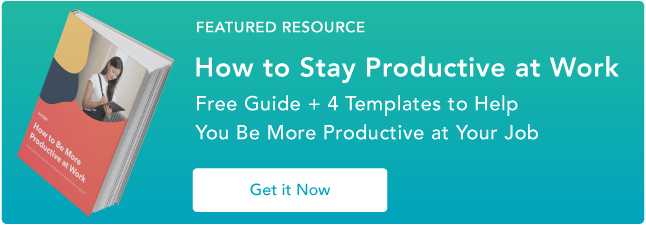What is Productivity: Your Complete Guide

By esantiago@hubspot.com (Erica Santiago)
Productivity is on the minds of almost every marketer, but what is productivity? How do you know if your idea of productivity aligns with that of your company or teams? Why is it necessary, and what can you do to be more productive?
In this article, we’re going to explore productivity, what it means, and why you should care.
What is productivity?
Dictionary.com defines productivity as “the quality, state, or fact of being able to generate, create, enhance, or bring forth goods and services.” In an economic context, the meaning is similar — it’s essentially a measure of the output of goods and services available for monetary exchange.
However, productivity can mean something different when applied to our personal and professional lives. According to Friday.app, a productivity management tool, productivity is how efficiently you can consistently complete tasks that are important to you.
For many people, productivity can mean checking off everything on their daily to-do list. For others, productivity can be about getting more done in shrinking amounts of time. No matter your goals, you want to avoid “toxic productivity.” Toxic productivity is the desire to be constantly productive, no matter the cost.
Fortunately, it’s possible to strike a healthy balance and be productive without overdoing it.
How to be More Productive
If you’re struggling to complete your tasks or you want to become more efficient, here are some ways to be more productive both inside and outside the office.
Stop multitasking.
It’s a common misconception that multitasking can boost productivity because it entails working on multiple tasks simultaneously. However, according to most recent studies, only a tiny percentage of people can multitask effectively because the human brain can only focus on one task at a time, according to studies.
Multitasking causes our brains to divide attention between different tasks, which can lead to more mistakes being made and a lower-quality performance. Instead, try grouping similar tasks together and completing them one by one.
Schedule breaks.
There have been times when I’ve gotten so engrossed in a project that I accidentally skipped lunch or worked exceptionally late into the evening. While putting in more hours or skipping meals may create more time for productivity, the reality is that your body needs fuel and time to recharge.
Schedule breaks during or between tasks, and use that time to eat lunch, walk, stretch, meditate, or rest.
Set boundaries.
You must be comfortable saying ‘no’ to boost and maintain productivity. It’s great to be helpful whenever possible, but you should say ‘no’ to last-minute requests, impromptu phone calls, or any plans to set you back on your progress.
Otherwise, you can slow your workflow by taking on too many responsibilities …read more
Source:: HubSpot Blog

![Download Now: How to Be More Productive at Work [Free Guide + Templates]](https://no-cache.hubspot.com/cta/default/53/be08853d-7ccb-4ab6-ba13-ef66a1d9b4ff.png)







